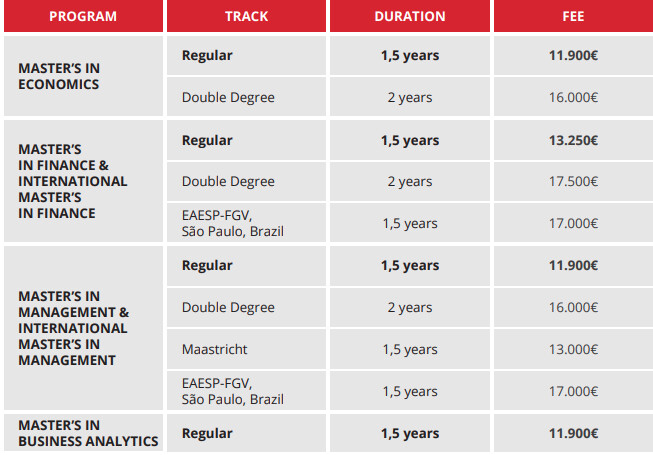Master’s in Economics
Nova School of Business and Economics (NOVA SBE)
-
Plaats Lissabon, Portugal
-
Degree Type Master
-
Start Date No info
-
Looptijd No info
-
Application Deadline No info
-
Taal Engels
-
Aanwezigheid On Campus
-
Toewijding Full time
-
Pace Instructor-paced
-
Tuition fees 11900 €
Beschrijving programma
The Master’s in Economics at Nova SBE is the 3rd best Master’s in Economics in Europe according to the 2019 Eduniversal rankings. Did we grab your attention yet? To that, we can add the opportunity to take part in an advanced program that includes analytical skills and economic policy awareness.
Are you ready to start building your successful career as an economist?
If you asked us to define our Master’s in Economics in three words, we would use: unique, hands-on and applicable.
We make sure that we provide state-of-the-art theoretical and empirical techniques, but we also focus on the development and acquisition of the tools required for applied policy analysis. This means econometric and numerical software or modern econometric techniques for the evaluation of policy interventions, to name a few.
Below you can find more information regarding the basic structure of the program, but remember — you can tailor-make the curriculum according to your interests. Please have a look at the electives (specialize in a specific field), areas of expertise (focus a part of your studies on a particular area of interest) and professional development modules (let’s talk about responsible leadership and creative thinking) sections as well, to make sure that you make this Master's your own.
Basic Structure*
Week 1
Discovery Week
1st Semester (30 ECTS)
STATA Module + Mandatory Courses
Electives (one full or two half courses)
Professional Development Modules
Study Trips
Career Development Program
Mastering Your Career
Nova Economics Club, Regular and Brownbag Seminars, Networking Events, Business Forum, Conferences
2nd Semester (30 ECTS)
STATA Module + Mandatory Courses
Electives (one full or two half courses)
Professional Development Modules
Study Trips
Career Development Program
Mentoring Program
Nova Economics Club, Regular and Brownbag Seminars, Networking Events, Business Forum, Conferences
3rd Semester (30 ECTS)
Work Project
Career Development Program
Nova Economics Club, Regular and Brownbag Seminars, Networking Events, Business Forum, Conferences
* Please note that for the academic year of 2021/2022 this information may be subject to changes.
What’s at the finish line?
The Work Project
Students must complete a Master’s Work Project, which is equivalent to a Master’s Thesis. You can choose one of the following to finish your studies with flying colors.
Directed Research
An original piece of work on a topic proposed and supervised by a professor. This may also take the form of a case study.
Field Lab
A group project developed in collaboration with a public or private institution and under supervision by a professor.
Internship
An internship where students develop a project in a problem-solving format for a company, in response to a predefined question/problem raised by the host organization and under the supervision of a Nova SBE Professor. Students may apply for internships offered by Nova SBE or obtain one directly from a company through their own contacts.
ECTS this, ECTS that
How does the grading system work?
Grading is based upon the European Credit Transfer System (ECTS), a grading scale developed to facilitate the understanding and comparison of grades, according to different national systems.
We did the math for you, and the awarding of ECTS grades per curriculum component breaks down as follows:
30 ECTS
in Mandatory Courses including the Mastering Your Career Activities
(Bridging courses not included)
28 ECTS
in Elective Courses (minimum)
2 ECTS
in Professional Development Modules
0 ECTS
MS Excel Certification
30 ECTS
in the Work Project
You need a minimum of 90 ECTS to complete your Master’s, but if you need 120 ECTS to proceed with your studies, you can extend your Master’s by one semester with courses (28 ECTS) and modules (2 ECTS).
FEES




